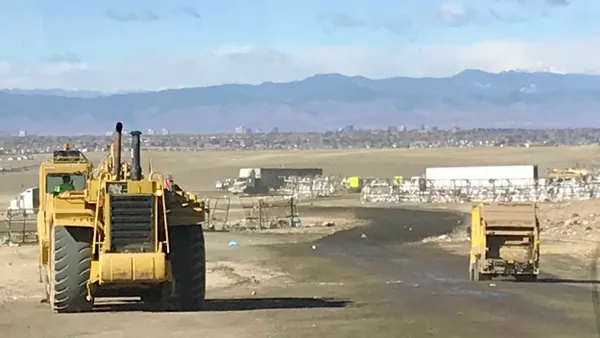UPDATE: June 13, 2019: In a reinstatement of a county judge's initial ruling, the state Supreme Court has ordered the New Jersey Sports and Exposition Authority to close the Keegan Landfill until July 25, as reported by NJ.com.
"We're elated. This was the best outcome we could have hoped for," said Kearny Mayor Al Santos on Wednesday. "My thinking was if the Supreme Court justices looked at our papers carefully we would get our closure."
Dive Brief:
- A county judge recently sided with the town of Kearny, New Jersey by issuing an injunction against the Keegan Landfill and ordering it to close until July 25. Superior Court Judge Jeffrey Jablonski was set to determine on that date whether the facility should be permanently closed, as reported by The North Jersey Record.
- The New Jersey Sports and Exposition Authority (NJSEA), which owns the site, has now successfully appealed that order. A May 31 ruling by two appellate court judges found the initial decision to be "unsupported by any record evidence," according to the Jersey Journal, allowing the landfill to remain open until the original case is resolved.
- According to the Journal, Kearny residents have complained of odors coming from the landfill since at least May 2018, which have since been partially attributed to hydrogen sulfide. Kearny Mayor Al Santos filed a records request with the state Department of Environmental Protection (DEP) in January and obtained a video showing what he claimed was illegal sewage disposal.
Dive Insight:
The Keegan facility is the last landfill in New Jersey Meadowlands, a region once riddled with large, unregulated disposal sites and environmental contamination. Kearny officials and residents have long had a tense relationship with the Keegan Landfill operators, and news of the alleged sewage dumping brought those tensions to a boiling point over the winter.
In February, Kearny officials asked residents to sign a petition claiming that noxious odors from the site made residents ill and urging Gov. Phil Murphy to close the 110-acre facility. NJSEA entered into an administrative consent order with the DEP in March to require installation of a continuous emissions monitoring system.
In April, town officials took both NJSEA and DEP to court, demanding access to records and correspondence between the two agencies. DEP has conducted regular inspections of the landfill since discovering elevated levels of hydrogen sulfide in January. The gas, which has a rotten egg-like odor, can irritate the sinuses or cause headaches and nausea.
Judge Jablonski's May 24 ruling found that residents would face "immediate and irreparable harm" if the landfill continued operation. In its appeal, NJSEA argued that the elevated levels of hydrogen sulfide did not necessarily provide evidence of imminent danger to the public or justify closure. The landfill owner also claimed it would suffer irreparable harm if Keegan Landfill permanently lost business from the closure.
"They also have the audacity to cry about losing revenue and their regular customers, actually lamenting, 'Some of those customers may never come back to Keegan,' as if we were some kind of retail shop losing sales," Santos wrote on his Facebook page.
The Keegan Landfill earned NJSEA $17.7 million in tip fees last year. The facility was scheduled for permanent closure in June 2016, but a New Jersey Superior Court judge ruled against the decision in 2016, saying it would have "drastic and deleterious effects" on local towns and taxpayers.









